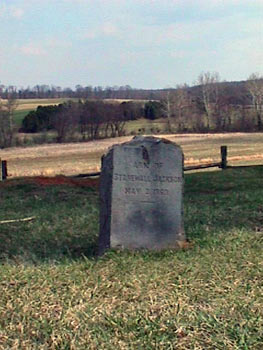Jackson got the nickname "Stonewall" from Confederate General Barnard E. Bee, when he moved an artillery battery up to support Bee's troops as they retreated at the First Battle of Bull Run (called First Manassas by Confederate troops)(1). Bee said of the mostly unheralded Colonel, "There is Jackson standing like a stone wall. Let us determine to die here, and we will conquer. Rally behind the Virginians."
At The Battle of Chancellorsville on May 2nd, 1863, Jackson went on a scouting mission at night and when he returned was hit by friendly fire. Three bullets struck him and one(2) severed an artery in his arm. They amputated the arm but and he died on May 10th, 1863 - yesterday was the 150th anniversary of that death and has led to another examination of what actually killed him, infection or pneumonia or something else.
The original medical report had listed pneumonia as the cause, a counter-intuitive finding to non-doctors after an amputation under battlefield conditions in 1863. But Confederate physician Hunter McGuire knew what he was doing and pneumonia was the third leading cause of death during the war.
How could pneumonia get him when infection did not? Joseph J. DuBose, M.D., clinical assistant professor of surgery at the University of Maryland School of Medicine and a trauma surgeon told The Associated Press that it took two hours to get Jackson to a hospital and that they dropped him en route twice. "If he had been dropped and had a pulmonary contusion, or bruise of the lung, it creates an area of the lung that doesn't clear secretions real well, and it can be a focus that pneumonia can start in," DuBose said. "That's probably what happened in this particular instance."
Dubose noted that pulmonary such embolisms occur 5.7 percent of combat casualties even today and is more common among those who have amputations.
So if the attending physician, who was clearly ahead of his time and is the best source of knowledge, said pneumonia, what is the issue?
There was no coughing. People with pneumonia tend to cough.
Dr. Philip Mackowiak, an internist who organizes a conference at the University of Maryland each year to review medical diagnoses of historical figures, says he believes a recurrent pulmonary emboli destroyed Jackson's lung over time. Yet Dr. McGuire also did not report that General Jackson coughed up blood or had a change in pulse, shortness of breath or decreased mental ability that hypotension (low blood pressure) due a large embolism would cause.
So the debate rages on.
Jackson was so significant to troops that his amputated arm got its own grave. While Jackson's body is in Lexington, Virginia, his arm is a hundred miles away at Lacy Farm cemetery, where the farm house nearby had been the field hospital. His soldiers held a ceremony for the arm. The tombstone says "Arm of Stonewall Jackson, May 2, 1863".

The "Old Jack" talk was Friday, May 10, 2013 – 1:30 p.m in Davidge Hall at University of Maryland Baltimore.
NOTES:
(1) Bull Run is a tributary stream of the Potomac River that starts in the Bull Run mountains while Manassas is the city and now the name of the National Battlefield Park. The counter-attack inspired by Jackson's defense caused the Union soldiers, who had been winning, to retreat, eliminating the Union notion that Confederate troops lacked resolve. Jackson was a lynchpin in that battle, securing his name in American military history and Bull Run became famous as its largest, bloodiest battle - until later in the Civil War. Jackson's Valley Campaign in 1862 covered 646 miles in 48 days and won 5 victories using 17,000 soldiers against a combined force of 60,000. He was the most inspirational leader in the Confederate army, eclipsed by Gen. Robert E. Lee only after Jackson's death.
(2) You can respond to the claim by anti-gun people that early Americans didn't "need" a .50 caliber weapon by conceding the point and noting those were too small. They used .80 caliber whenever possible and would have broken the .223 some want to call an 'assault weapon' today over their knees. In this instance, the three bullets that struck Jackson were 0.69 caliber. It wasn't the first time he had been shot but it would be the last and because it was friendly fire it added to the legend that no Union soldier could kill him. Three 0.69 bullets! They were not big men in the Civil War but they were clearly Big Men.
While wandering around an old battlefield in South Carolina (not one of the parks, one of the many battlefields that are just local sites) I found a Civil War bullet. Here it is next to a coffee cup and a pen for comparison.






Comments